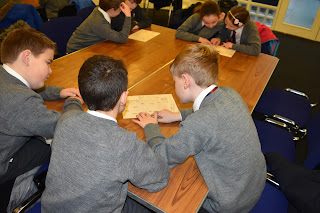Tuesday was the last day of our outreach workshops for The Ulster Scots Archaeological Services Project. It has been a great couple of months meeting a fantastic and diverse group of participants. We have met with 12 groups and over 360 people in the past four months and shared what we know about the archaeology of the Plantation.
 |
| Gavin Donaghy talking to the residents of Clifton House, Hopewell Avenue. |
This week we visited two residential homes, Clifton House on Hopewell Avenue and Clifton House on North Queen Street. We had very lively discussions about both the artefacts and the history surrounding them and it was great to hear the groups reminisce about their own experiences with cultural change over the past century.
 |
| Residents of Clifton House, North Queen Street examining some artefacts. |
We would like to take this opportunity to thank Mary and Geraldine Scullion for inviting us and for taking part in our workshops. We had a great time with both groups and got lots of fantastic questions and feedback.
We would also like to thank all of the groups that took part in the outreach programme. We had a brilliant response from everyone involved and enjoyed sharing what we know with everyone. This is the end of our workshops programme but please keep your eyes peeled for more exciting news about Ulster Scots Archaeology.




















